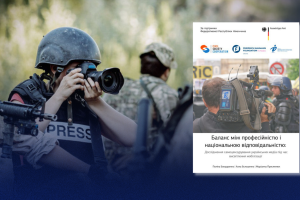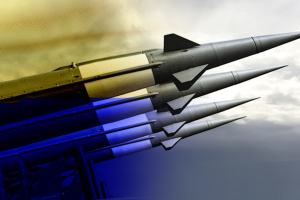The Ilko Kucheriv Democratic Initiatives Foundation conducted a nationwide public opinion poll among Ukrainian citizens jointly with the Kyiv International Institute of Sociology during November 4-19, 2019.
The poll was conducted in 110 populated areas in all oblasts of Ukraine, with the exception of Crimea. The poll was conducted in the Donetsk and Luhansk oblasts only on the territories that are controlled by Ukraine.
During the field stage of polling, a total of 2,041questionnaires were gathered. The theoretical margin of error does not exceed 2.3%. The polling was financed by the EU Delegation to Ukraine.
For comparison, we provide the results of nationwide polling conducted by the Ilko Kucheriv Democratic Initiatives Foundation jointly with the Kyiv International Institute of Sociology (October 9-19, 2015) and the Razumkov Center (May 11-16, 2016, June 9-13, 2017, May 19-25, 2018, December 19-25, 2018 and June 13-20, 2019).
- 45% of Ukrainians define the conflict in the Donbas as “Russian aggression against Ukraine with the use of local belligerents”. Such opinion is widespread in the western (64%) and central regions (54%), though it is less popular in the eastern (24%) and southern regions (22%). Other interpretations of the conflict are not as common: only 17% think that this is “a domestic conflict where Russia backs one of the sides”, 13% think it is “a war between Russia and the West on the territory of Ukraine” and only 12% believe that’s “exclusively internal civil conflict in Ukraine”. Interpretation of the conflict in the Donbas as “exclusively internal civil conflict in Ukraine” is shared by 22% of respondents from southern regions and 21% from the eastern regions. Also, such opinion is shared by 31% of people, who voted for the political party “Opposition Platform – For Life”, and 12% of people who voted for party “Servant of People” party, and only 2.5% of voters of “European Solidarity” think so too.
- 30% of Ukrainians believe that the goal of Russian aggression in Donbas was subordinating Ukraine and taking it back into Russian sphere of influence. This opinion is shared by 41% of respondents in the western 35% in the central regions, while only 20% in the southern and 17% in the eastern regions. 18% of citizens believe that objective of the Russian aggression was to annex southern and eastern regions of Ukraine. Only 9% of citizens believe that the aim of the aggression was “protection of the Russian-speaking population”. However, while only 3% of citizens in the western regions share this view, in the East this opinion is shared by 22%. It is worth mentioning that 35% of people from southern regions and 30% from the eastern regions do not choose any option.
- Majority of Ukrainians justify resistance to the Russian aggression and Russian proxies in Donbas by necessity to restore territorial integrity and sovereignty of Ukraine in internationally recognized borders (39%) and to defend the national independence and the right of Ukraine to independently decide its future (31%). At the same time 21% of citizens do not express their opinion about this issue (30% in the southern, 24,5% in the central, and 23% in the eastern regions).
- 29% of Ukrainians believe that separatists fight because they are paid by Russia for participation in military actions. Other interpretations of separatists’ motives are not as popular: 17% think separatists are fighting to “reunite with Russia”, 11% agree that separatist “want to redistribute private and public property”, 9.5% believe that separatists “resist against imposing Ukrainian identity unto Russian-speaking population”, 9% think that separatists “protect local population from radical nationalists (called “banderivtsi”), 3% say that separatists “want to restore Soviet lifestyle”. 21% of respondents do not answer this question.
- Nearly half of Ukrainians believe that peace in the Donbas can be achieved by applying international diplomatic pressure on Russia, strengthening the sanctions and applying of international law mechanisms (29%) and by reinforcing economic and military power of Ukraine (21%). People in the western Ukraine share such opinions (43% and 27%, accordingly) as well as in the central regions (30% and 27%, accordingly). In the eastern regions 53% of the people think that peace can be achieved in the Donbas by holding talks with representatives of recognized DNR and LNR as legitimate proto-states (24%) and by negotiations with Moscow while accepting autonomy of the Donbas and forgetting about Crimea (29%).
- Only 14% of Ukrainians think it is worth agreeing to any compromises for the sake of peace. On the other hand, 58.5% of Ukrainians feel that some compromises are acceptable and some are not (in June 2019 49% supported such opinion). This position dominates in all regions of Ukraine: in the west (57%), the center (53%), the south (60%), and the east (67%). Peace at all cost is acceptable for 24% in the south, 18% in the east, 10% in the center and 13% in the west. At the same time 29% in the west and 20% in the center think that peace in the Donbas can be achieved only after decisive victory of either side. Around 33% of the supporters of the “Opposition Platform – For Life” party and 14% of the supporters of the “Servant of People” party are ready to accept peace agreement at any cost. Only 5% of the European Solidarity party voters support with such option.
- As in the previous polls, absolute majority of Ukrainians do not accept conditions of the Minsk agreements. The holding of elections on the conditions of the militants is considered unacceptable by 66% of the people and acceptable by 16% of the polled. Amnesty for all participants of military actions against Ukrainian army unacceptable for 63% and acceptable for 19%. Establishment of “local militia, courts and prosecution” in the Certain Districts of the Donetsk and Luhansk Oblasts (CDDLO) unacceptable for 56% and acceptable for 21%. Respondents from southern and eastern regions are more inclined to make certain concessions – 41% and 53.5% of them respectively consider including provision about the “special status” for CDDLO in the Constitution of Ukraine; neutral or non-bloc status of Ukraine is acceptable for nearly 60% of the residents of these regions; granting the Russian language the status of a state language is acceptable for 51.5% in the South and 70% in the East; 64-67% of citizens in both regions are looking for re-opening of trade with the occupied territories.
- The majority of Ukrainians consider that the most effective measures for achieving peace is restoration of normal life in the government-controlled areas of Donbas (32%) and international pressure on Russia (another 32%). Only 15% feel that granting the DNR and LNR “special status” within the territory of Ukraine would be effective. It is important that nearly 22% of respondents do not express their opinion on the matter.
- 62% of Ukrainians think that territories of the DNR and LNR must return on the pre-war conditions. Comparing with earlier polls we can say that such option became more popular among Ukrainian population. Only 4% of the polled support the separation of these territories from Ukraine. Nearly 22% consider that these territories should be granted more independence from the central government, but within unitary Ukraine. Nearly 30% of citizens in the South and the East of Ukraine are in favor of giving more independence to these territories, while for the residents of western and central Ukraine pre-war conditions are more acceptable (78% and 64% respectively).
- For years Ukrainians have had positive perception of deployment of the peacekeeping forces on the territories of the DNR and LNR (59%). However, only 47% of residents of the eastern regions support such a decision, while the 70% in the Western oblasts and 64%in the Southern regions are in favor of such decision.
- Ukrainians think that mutual withdrawal of combat troops from the line of contact in Donbas is a good decision. It is supported by 60% of respondents and rejected by 27% while the rest are undecided. However, there are significant regional differences: in the south and the east nearly 74-79% of citizens perceive such step positively, while in central Ukraine – 53% and in Western Ukraine – 47%. Voters of the “Opposition Platform – For Life” party almost unanimously support such decision (90%). Also 69% of supporters of the party “Servant of People” endorse such decision, while 20% of them do not like it and 10% are undecided. The attitude of the supporters of the “European Solidarity” party is different: only 19% of them approve the withdrawal of troops, while 72% have a negative attitude towards it.
- Majority of Ukrainians has a restrained attitude towards local elections in the territories of the Donetsk and Luhansk oblast, which are not controlled by Ukraine – only 20% of respondents say that elections must be organized as soon as possible without any conditions from Ukrainian side. Another 21% support having elections after liberation of these territories from the Russian army and the disarmament of militants, while 24.5% of Ukrainians feel that elections can be called after Ukraine gains full control over these territories. In the South and East of Ukraine, people are more loyal to having elections without preconditions (37% and 38%), while in Western and Central Ukraine only 9% and 11% respectively support this option. Local elections in Donbas without preconditions are supported by 52% voters of the “Opposition Platform – For Ukraine” party, 20% of voters of “Servant of the People” party, and only 5% of supporters of the “European Solidarity” party.
- Full amnesty for all combatants from DNR and LNR is not acceptable for Ukrainian citizens – only 8% expressed their support for such measure. Another 22% consider that amnesty can be granted to combatants from illegal armed forces except people who committed serious crimes (killing of civilians, torture, etc.). One fourth of Ukrainian citizens is not ready for any kinds of amnesty. In their opinion, everybody should be prosecuted for their crimes.








